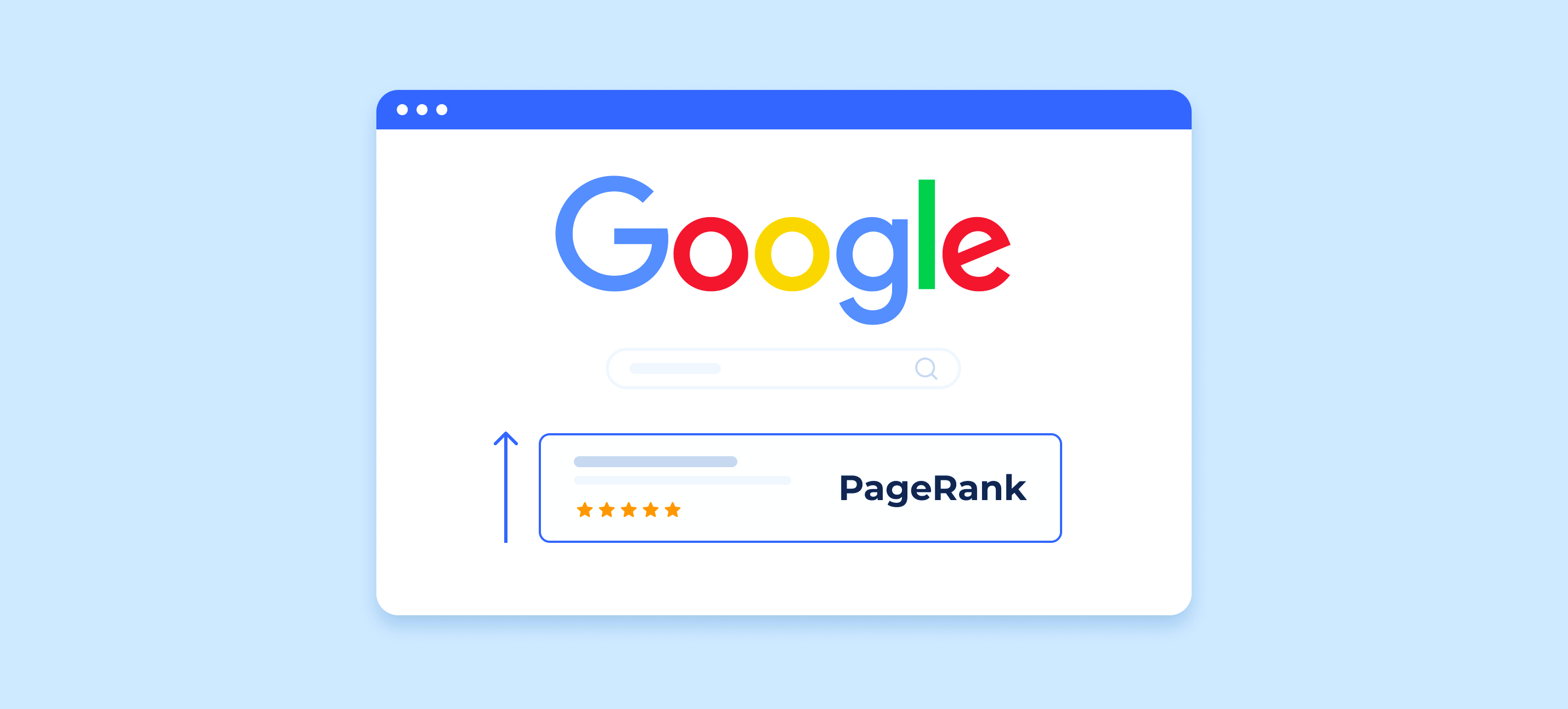
What is Google Page Ranking?
Google ranking refers to the position at which a website or web page appears in the search engine results pages (SERPs) when users enter relevant queries or keywords into Google's search engine. Essentially, it determines the visibility and prominence of a website or web page in Google's search results.
Google uses complex algorithms to analyze and rank web pages based on various factors, including:

(1) Relevance: How well the content on a web page matches the user's search query. Pages that contain relevant keywords, topics, and information are more likely to rank higher in search results.
(2) Quality: The overall quality and credibility of a web page, including factors such as content depth, originality, accuracy, and trustworthiness. High-quality content is favored by Google and tends to rank higher.
(3) Authority: The authority and credibility of the website or domain hosting the web page. Websites with a strong reputation, backlinks from authoritative sources, and a history of providing valuable content are more likely to rank higher.
(4) User Experience: Factors related to the user experience, such as page load speed, mobile-friendliness, ease of navigation, and accessibility. Google prioritizes websites that provide a positive and seamless user experience.
(5) Technical Optimization: Technical aspects of website optimization, including proper HTML coding, meta tags, structured data markup, and optimization for search engine crawlers. Ensuring that a website is technically optimized can improve its chances of ranking higher in Google search results.
Google ranking is dynamic and can change over time based on updates to Google's algorithms, changes in user behavior, and the competitiveness of the search landscape. Websites and web pages that consistently provide valuable, relevant, and high-quality content while adhering to best practices for SEO are more likely to achieve higher rankings in Google search results.
What is Google Algorithms?
Google algorithms are complex mathematical formulas and rules used by the Google search engine to determine the relevance, quality, and ranking of web pages in search results. These algorithms analyze hundreds of factors to evaluate and rank web pages based on their relevance to a user's search query. The primary purpose of Google algorithms is to provide users with the most useful and authoritative results for their search queries.
Google regularly updates and refines its algorithms to improve the quality of search results and adapt to changes in user behavior, technology, and the web landscape. Some of the most well-known Google algorithms include:
(1) PageRank: Developed by Google co-founders Larry Page and Sergey Brin, PageRank was one of the first algorithms used by Google to rank web pages based on the number and quality of links pointing to them. While PageRank is no longer the sole determinant of rankings, backlinks remain an important ranking factor.
(2) Panda: Introduced in 2011, the Panda algorithm aims to penalize low-quality or thin content, content farms, and websites with poor user experience. It evaluates factors such as content quality, uniqueness, and relevance to determine rankings.
(3) Penguin: Launched in 2012, the Penguin algorithm targets websites that engage in manipulative link building practices, such as buying links or participating in link schemes. It penalizes websites with spammy or unnatural backlink profiles.
(4) Hummingbird: Released in 2013, Hummingbird focuses on understanding the meaning behind search queries and delivering more relevant results. It introduced the concept of semantic search, allowing Google to better understand the context and intent of a user's query.
(5) RankBrain: Introduced in 2015, RankBrain is a machine learning algorithm that helps Google understand and interpret complex search queries. It uses artificial intelligence to analyze search patterns and deliver more relevant results, particularly for long-tail or ambiguous queries.
(6) BERT (Bidirectional Encoder Representations from Transformers): Rolled out in 2019, BERT improves Google's understanding of natural language processing and context in search queries. It enables Google to better understand the nuances of language and deliver more accurate and relevant results.
These are just a few examples of the many algorithms that Google uses to determine search rankings. Google's algorithms are constantly evolving, and updates are made regularly to improve the quality and relevance of search results for users. Understanding Google algorithms and optimizing for them is essential for website owners and marketers seeking to improve their visibility in search results.
How to rank on Google first page?
Ranking on the first page of Google search results requires a combination of strategic planning, optimization efforts, and ongoing maintenance. While there is no guaranteed method to achieve a top ranking, following best practices for search engine optimization (SEO) can significantly improve your chances of appearing prominently in search results. Here are some steps to help you rank on Google's first page:
(1) Understand Your Audience: Conduct thorough keyword research to identify the terms and phrases your target audience is searching for. Use tools like Google Keyword Planner, SEMrush, or Ahrefs to discover relevant keywords with high search volume and low competition.
(2) Create High-Quality Content: Develop comprehensive, informative, and engaging content that addresses the needs and interests of your target audience. Focus on providing value, answering common questions, and solving problems. Use a variety of content formats, including articles, blog posts, videos, infographics, and interactive elements.
(3) Optimize On-Page Elements: Optimize on-page elements such as title tags, meta descriptions, headings, and URLs to include relevant keywords and accurately describe the content of your pages. Ensure that your content is well-organized, easy to read, and provides a positive user experience.
(4) Improve Page Speed and Mobile-Friendliness: Google considers page speed and mobile-friendliness as important ranking factors. Optimize your website's performance by minimizing loading times, optimizing images, leveraging browser caching, and using responsive design to ensure your site looks and functions well on mobile devices.
(5) Build Quality Backlinks: Earn high-quality backlinks from authoritative and relevant websites in your industry. Focus on natural link-building strategies such as creating valuable content, guest blogging, participating in industry forums, and reaching out to influencers or journalists for coverage.
(6) Optimize for Local SEO (if applicable): If your business serves a local audience, optimize your website for local search by claiming and optimizing your Google My Business listing, ensuring consistent NAP (name, address, phone number) information across online directories, and earning positive reviews from satisfied customers.
(7) Use Schema Markup: Implement schema markup on your website to provide search engines with additional context about your content. Schema markup helps improve the visibility of your website in search results and can enhance rich snippets, such as star ratings, reviews, and FAQ sections.
(8) Monitor and Analyze Performance: Regularly monitor your website's performance using tools like Google Analytics and Google Search Console. Track key metrics such as organic traffic, click-through rates, bounce rates, and keyword rankings. Use this data to identify areas for improvement and adjust your SEO strategy accordingly.
(9) Stay Updated with Google's Algorithm Changes: Keep abreast of updates to Google's algorithms and guidelines, as they can impact your website's rankings. Stay informed through industry publications, official Google announcements, and reputable SEO resources.
10) Be Patient and Persistent: Achieving and maintaining a top ranking on Google's first page takes time, effort, and ongoing optimization. Be patient, continue to refine your SEO strategy based on data and insights, and remain persistent in your efforts to improve your website's visibility in search results.
By following these best practices and consistently optimizing your website for search engines, you can increase your chances of ranking on Google's first page and driving organic traffic to your website.
Things to Avoid for Best SEO Results
Achieving success in SEO requires following best practices, but it's equally important to avoid common mistakes that can hurt your rankings. Below are some of the key things to avoid when optimizing your website for search engines:

1. Keyword Stuffing
One of the most common SEO mistakes is keyword stuffing—the practice of overloading your content with keywords in an unnatural way. Google’s algorithms are highly advanced, and they can easily detect when a website is trying to manipulate rankings by repeating keywords too frequently. Keyword stuffing not only harms your rankings but can also result in penalties. Instead, focus on natural keyword placement that enhances the readability and flow of your content.
Example: Instead of repeating “best SEO tips” in every sentence, aim for variations and use it where it makes sense.
Solution: Prioritize writing for humans first. Include keywords naturally and sparingly, and make sure they add value to your content.
2. Plagiarized or Duplicate Content
Google values original, high-quality content. Publishing duplicate content—whether it's copied from other websites or exists elsewhere on your own site—can negatively impact your SEO. Google might not know which version to rank, leading to lower visibility or even penalties.
Solution: Always create original content. Use tools like Copyscape or Grammarly’s plagiarism checker to ensure your work is unique before publishing. If you need to quote or reference other content, always give credit and use proper citations.
3. Ignoring Mobile Optimization
With more than half of all web traffic coming from mobile devices, failing to optimize your website for mobile can hurt both your user experience and your SEO rankings. Google now uses mobile-first indexing, meaning it primarily looks at the mobile version of a site for indexing and ranking.
Solution: Use a responsive design to ensure your site works well on all devices—phones, tablets, and desktops. Test your website’s mobile usability using Google’s Mobile-Friendly Test tool and fix any issues that arise.
4. Slow Website Speed
Page speed is a crucial ranking factor in Google’s algorithm. If your website loads slowly, not only will users leave, but search engines will also rank your site lower. A slow site can lead to poor user experience, higher bounce rates, and lower conversion rates.
Solution: Optimize your website’s speed by compressing images, using browser caching, minimizing JavaScript and CSS files, and leveraging Content Delivery Networks (CDNs). Use tools like Google PageSpeed Insights or GTmetrix to assess your website’s speed and identify areas for improvement.
5. Using Irrelevant or Low-Quality Backlinks
Backlinks are one of the most important factors in Google’s ranking algorithm, but not all backlinks are created equal. Low-quality backlinks—from spammy or irrelevant sites—can harm your rankings. Additionally, using tactics like buying backlinks or engaging in link schemes can lead to a penalty from Google.
Solution: Focus on earning high-quality backlinks from reputable, relevant websites in your niche. You can achieve this by creating valuable content that others naturally want to link to or by doing outreach to influencers and websites.
6. Not Optimizing for Local SEO
For businesses that rely on local customers, ignoring local SEO can be a costly mistake. Failing to include local keywords, not claiming or optimizing your Google My Business (GMB) profile, and having inconsistent NAP (Name, Address, Phone) information across the web can hurt your visibility in local search results.
Solution:Optimize your content with local keywords (e.g., “best website development agency in Mumbai”), claim and regularly update your GMB profile, and ensure your NAP information is consistent across all platforms and directories.
7. Neglecting Meta Tags
Meta titles and meta descriptions play a key role in helping search engines understand the content of your pages. Not using meta tags, or using duplicate or irrelevant ones, can hurt your rankings. Additionally, meta tags are what users see in search results, so neglecting them can reduce your click-through rate (CTR).
Solution: Write unique, descriptive meta titles and descriptions for each page, ensuring that they include your primary keywords and accurately describe the content of the page. Keep titles under 60 characters and descriptions under 160 characters.
Solution: Compress images to reduce their size without compromising quality. Use descriptive alt text for each image, including relevant keywords when appropriate, to improve both accessibility and SEO.
9. Not Updating Content Regularly
Outdated content can make your website appear stale, hurting your credibility and rankings. If you haven’t updated your blog or website in a while, search engines may consider it less relevant, which could lead to a drop in rankings.
Solution: Regularly refresh and update your content. Keep your information current, especially for time-sensitive topics like industry trends or updates in your niche. A blog or news section can help keep your website active.
Commit to a niche; try to stop being everything to everyone.
Andrew Davis
10. Ignoring User Experience (UX)
Search engines prioritize websites that provide a good user experience (UX). A site that’s difficult to navigate, cluttered, or full of pop-ups and ads can frustrate users, leading to higher bounce rates and lower rankings.
Solution: Focus on creating a clean, easy-to-navigate website. Keep your layout simple, avoid intrusive ads, and ensure that your website is accessible to all users.
By avoiding these common SEO mistakes, you’ll be well on your way to improving your website’s rankings and overall performance. SEO is about creating a balance between technical optimization, content quality, and user experience. Stay updated with the latest SEO trends and continue to adapt to changes in Google’s algorithm for the best results.








